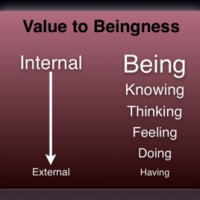page=20
page=20
assured, you’ll find it fun to pursue your goals using this process, because you’ll feel freer and happier every step of the way.
Robert: Manifesting Without Fretting about It
At age 63, Robert had been thinking of retiring. He was managing a multimillion-dollar project for the federal government that was turning sour and he felt desperate for it to work out. Then, he found himself in the midst of an acrimonious divorce, and his ex-wife took a large settlement. Suddenly, he was in bad financial shape, and he was furious. That’s when he purchased a set of Sedona Method audiotapes and began listening to them.
Robert had made a personal discovery about hootlessness years earlier. He found that if he really needed or wanted some material object to be his, the first thing to do was to articulate clearly in his mind exactly what it was that he wanted. The second and most important step was to expel any feelings of need or want, just let it go. Then, sooner or later, whatever he wanted would materialize! Whenever he could do this, he enjoyed amazing results. Conversely, if he fretted or lusted after it, it would never happen. It was a revelation to him when he heard this phenomenon explained by the Sedona Method. He finally understood how it relates to the basic needs of acceptance, control, and security. He honestly believes that it was no coincidence that, halfway through the tape program, he enjoyed a “miracle” that made him a millionaire overnight―literally! An investment of his tripled in value through an unpredictable sequence of events.
That isn’t the end of the story, however, for Robert had several goals. His top priority was to rid himself of any negative feelings about the people in his life. This was accomplished almost immediately by daily releasing. He also wanted more money than he got in his stock windfall, and to have a job where he could work at home and set his own hours. He was ready to quit his job and travel, but his boss wouldn’t let him go. So, he became a consultant. And even though basically nobody in the federal government works from home, Robert now did. He doubled his income after his “retirement.” In
addition, he wanted to live in a house by a lake. By using the Goal Process, he manifested his dream home within a year. He simply would visualize watching a sunset over the lake from a position seated behind his desk. Then, he would use the three basic releasing questions and let it go entirely. He didn’t angst about it.
One day, Robert happened to be driving by a lake and saw a sign listing several properties for sale. He stopped and looked at a few nice houses that for different reasons just didn’t appeal to him. Then, he noticed a path leading to another house nearer the water. When he walked into that house, he could see the lake out a front bay window. In fact, every single room, except the two bathrooms, faced the lake. It was the right size for him: not too big, not too small. The previous owners had taken out some walls, and he’d only have to make minor modifications. As the price was good, he bought it on the spot.
In Robert’s own words, “Hootlessness is important and dear to me. Everything I have that I really like, and that I’ve wanted to have, has appeared through that state. I can’t tell you how often it happens. The mind is precious real estate. Before I learned the Method, I already understood the need to set goals and relax the mind. It gave me a way.”
Releasing Your Feelings about Setting Goals
Before we actually work on the Goal Process, let’s do some general releasing on goals. As I explained at the beginning of the chapter, most of us have a lot of different feelings about pursuing goals. We live in a goal oriented society that’s often unforgiving. If we’ve achieved them in our past attempts, we may be enthusiastic about goals. But even when we have succeeded in the past, we may feel some trepidation about adopting a new way of working on goals and about moving forward. And what if we haven’t succeeded? If we’ve tried to achieve goals before and failed, we’re likely to transfer our feelings about these past failures into any future efforts.
So, see how you feel about your past history with goals. Notice what you feel about goals in general.
Allow yourself to feel however you feel in the NOW about goals. Welcome the feeling as best you can. Allow it to be here.
Then, could you allow yourself to notice from which want it’s coming (approval, control, or safety)?
Could you let that want go?
Now, think of a specific time when you didn’t achieve a goal. You set the goal up. You took steps to achieve it, and yet it didn’t happen. How do you feel about that now?
Embrace how you feel in this moment about not having achieved that goal.
Could you allow the feeling just to be here?
Check to see if it’s coming from an underlying sense of wanting approval, control, or security.
Then, whichever want it is: Could you let it go?
Repeat this process focusing on the same memory if you still have feelings about it. Or move on to another time that you set a goal you did not attain, and let go on that. Welcome your feelings into awareness, determine which wants are stirred up in the moment, and release them as best you can.
Next, recall whether anyone has ever pressured you into going for a goal. Maybe you work in sales, or in a corporate environment that dictates a particular goal for you. Very often, we’re pressured into going for goals that we may not feel able to reach. Perhaps your parents or your spouse imposed a goal upon you. Once you have a situation in mind, notice what your NOW feeling is about it.
Simply allow yourself to feel however you feel in this moment about that time you were pressured to go for a goal.
Then check to see from which want it is coming.
Could you let that want go?
Focus again on that specific time in which you were pressured to go for a goal, either by yourself or someone else, and see how you feel about that now.
Is there any sense of wanting in association with that memory?
Could you let go of that want?
Now, think of a current goal that you feel like you should do, you must do, or you have to do. Maybe you don’t really want to do it, but you feel like you have to do it. How does that make you feel inside?
Could you allow that feeling to be here, just to let it be?
Does that stir up some resistance or another want?
Could you let that go?
Focus on the pressure to achieve goals, either exerted by yourself or someone else, and welcome that sense of pressure to have, to do or to be into your awareness.
Could you allow the pressure to be here and embrace it fully?
Check to see which want that pressure stirs up inside of you.
Then, could you let it go?
Going after our goals should always feel like a choice. The more often we can start freshly in every moment, without any preconceived notions, and without carrying around excess baggage from the past, the better our chances are to be truly successful at achieving the goals we’ve set for ourselves. Once you feel that you’ve let go of enough of your limiting beliefs and feelings, you’re ready to continue below with the Goal Process.
Crafting Your Goal Statements
Wording a Goal Statement
Writing down your goals is one of the keys to achieving them. In fact, studies of groups of successful people have shown that those who write down their goals are more likely to achieve them than people who only think about them. Furthermore, wording a goal correctly can make the difference between whether or not it is finally achieved. Before you move on to wording your goals, here are a few important points to keep in mind:
• Phrase your goal in the NOW, as though it is already achieved. Most of us fall into the trap of thinking that we’re going to create what we want in the future. But the future never seems to come. How many times have you said to yourself, “I’ll do that tomorrow,” and you didn’t do it? Whenever you’re holding in mind, “I’m going to do this later,” or “ ... next week,” or “ ... next year,” you’re projecting your goal forward.
Phrasing it as a future event tends to keep it always out of reach. This reminds me of a clever sign that one of my British students saw in a pub, which read: Free Beer Tomorrow. Nobody was ever able to collect on that offer!
• Phrase your goal in the positive. Put in what you want, not what you don’t want. Focus on the solution. Your goal statement should reflect the end result that you’d like to achieve. Avoid including anything you want to get rid of in your statement, because keeping in mind what you don’t want creates it. What if you would like to stop smoking, for instance? It would be inappropriate to phrase your goal: “I allow myself to stop smoking.”
Do you recall the earlier discussion about how the mind doesn’t translate words of negation, such as not, don’t, or stop, because it thinks in pictures? Right now, try not to think of a white elephant, and what do you think of? A white elephant.
Always put something in the goal that the mind can visualize. For example, “I allow myself to be a nonsmoker.” You can picture being a nonsmoker, as that’s something you can see―other people who aren’t smoking. You can also imagine a kinesthetic sensation of breathing deeply and freely or climbing a long flight of stairs without gasping for air. It makes a huge difference to word your goals in this manner.
• Your goal should feel realistic and right for you. It should seem possible―with a sense of “I can have it!” Suppose you are making $1,000 a week, but what you’d really like to earn is $10,000 a week. Upping your income from $1,000 to $10,000 might be too big a jump for you to accept in a single goal statement. Instead, you might start by wording the goal, “I allow myself to effortlessly make $2,500 a week.” That’s a stretch from where you currently are, but it seems more realistic.
The more attainable you make a goal―phrased so the mind can at least accept it as a possibility―the more easily you’ll be able to release the obstacles that you hold within you toward that goal’s achievement.
• Include yourself in the goal statement. In other words, if you want to clean your house, you might phrase your goal as, “I allow myself to clean my house,” rather than, “The house is clean.” When you say, “The house is clean,” you may not believe it. If you were to phrase it that way, on some level you might also start waiting for a miracle to happen so that the house gets clean by itself. Whereas, if you’ve had tremendous resistance in the past to cleaning your house, and then you release on the goal, “I allow myself easily to clean the house,” you could find yourself easily cleaning your house. That’s much simpler.
• Be precise and concise. Focus on one goal per statement.
Don’t diffuse your energy by creating multiple goals. Also, use as few words as possible, while being sure to make it a complete statement of what you want. Choose the exact words that convey a specific meaning that makes you feel enthusiastic. Enthusiasm is important.
Years ago, a man in a workshop set up a goal: “I allow myself to have an abundant income, so that I can have a new sports car, a house in the country, the maids to take care of the second house, and the perfect woman to have a relationship with to share all this.” As you can see, there were several goals within that one goal, and they were pulling him in different directions. The instructor helped the man simplify his goal by breaking it down into specific individual goals. They then created an umbrella goal that was appropriate for the whole situation: “I allow myself to have all the good things in life and enjoy them.” See how that includes everything?
• Be specific, but not limiting. Leave things as open as possible to allow for your results being upgraded from what you initially project.
• Eliminate the word “want.” As we’ve already discussed at length in Chapter 6, wanting bars you from having. Would you rather want to have a lot of money, or would you rather have a lot of money? Would you rather want the perfect relationship, or would you rather have the perfect relationship? Would you rather want good health, or would you rather have good health? “Want” is always equated with a feeling of lack or deprivation, so avoid putting the feeling of lack in your goal statement.
• Word your goal to facilitate letting go. Make sure to word the goal statement in a way that does not build in wanting approval, control, security, or separation. One area where you could get yourself into trouble is in the area of relationship. For example, if you set a goal: “I allow Mary (or Joe) to love me,” you might get locked into wanting approval. First of all, you’ll be running around doing all sorts of things to try to get the person to love you. Secondly, what if the person is not even the right match for you? The goal would be more open and inclusive if you phrased it, “I allow myself to have a loving relationship.” That’s easier to release on, and the result could be a relationship with the person with whom you’re currently interested, or it could not.
Another goal that could get you into trouble is, “I allow_____(another person’s name) to have/ be/do_____(something that you want them to have/be/do).” If you set up a goal statement in this way, it indicates that you want to control that other person’s experience. If someone in your experience appears to need assistance, it’s much more freeing to word your goal as follows: “I allow_____(the person’s name) to have whatever it is he or she wants for him or herself.” This approach is especially helpful for people who are suffering in any way. It grants them their own inner strength and knowingness―their Beingness.
• State the end result, not the means of achieving it. Let’s go back to the earlier example of netting an income of $2,500 a week. When you phrase your goal statement, don’t explain how you’re going to get the money. I’ve seen people word statements like: “I allow myself to make $2,500 a week by working eighteen hours a day, six days a week,” and a whole list of other actions that they thoug
page=20
assured, you’ll find it fun to pursue your goals using this process, because you’ll feel freer and happier every step of the way.
Robert: Manifesting Without Fretting about It
At age 63, Robert had been thinking of retiring. He was managing a multimillion-dollar project for the federal government that was turning sour and he felt desperate for it to work out. Then, he found himself in the midst of an acrimonious divorce, and his ex-wife took a large settlement. Suddenly, he was in bad financial shape, and he was furious. That’s when he purchased a set of Sedona Method audiotapes and began listening to them.
Robert had made a personal discovery about hootlessness years earlier. He found that if he really needed or wanted some material object to be his, the first thing to do was to articulate clearly in his mind exactly what it was that he wanted. The second and most important step was to expel any feelings of need or want, just let it go. Then, sooner or later, whatever he wanted would materialize! Whenever he could do this, he enjoyed amazing results. Conversely, if he fretted or lusted after it, it would never happen. It was a revelation to him when he heard this phenomenon explained by the Sedona Method. He finally understood how it relates to the basic needs of acceptance, control, and security. He honestly believes that it was no coincidence that, halfway through the tape program, he enjoyed a “miracle” that made him a millionaire overnight―literally! An investment of his tripled in value through an unpredictable sequence of events.
That isn’t the end of the story, however, for Robert had several goals. His top priority was to rid himself of any negative feelings about the people in his life. This was accomplished almost immediately by daily releasing. He also wanted more money than he got in his stock windfall, and to have a job where he could work at home and set his own hours. He was ready to quit his job and travel, but his boss wouldn’t let him go. So, he became a consultant. And even though basically nobody in the federal government works from home, Robert now did. He doubled his income after his “retirement.” In
addition, he wanted to live in a house by a lake. By using the Goal Process, he manifested his dream home within a year. He simply would visualize watching a sunset over the lake from a position seated behind his desk. Then, he would use the three basic releasing questions and let it go entirely. He didn’t angst about it.
One day, Robert happened to be driving by a lake and saw a sign listing several properties for sale. He stopped and looked at a few nice houses that for different reasons just didn’t appeal to him. Then, he noticed a path leading to another house nearer the water. When he walked into that house, he could see the lake out a front bay window. In fact, every single room, except the two bathrooms, faced the lake. It was the right size for him: not too big, not too small. The previous owners had taken out some walls, and he’d only have to make minor modifications. As the price was good, he bought it on the spot.
In Robert’s own words, “Hootlessness is important and dear to me. Everything I have that I really like, and that I’ve wanted to have, has appeared through that state. I can’t tell you how often it happens. The mind is precious real estate. Before I learned the Method, I already understood the need to set goals and relax the mind. It gave me a way.”
Releasing Your Feelings about Setting Goals
Before we actually work on the Goal Process, let’s do some general releasing on goals. As I explained at the beginning of the chapter, most of us have a lot of different feelings about pursuing goals. We live in a goal oriented society that’s often unforgiving. If we’ve achieved them in our past attempts, we may be enthusiastic about goals. But even when we have succeeded in the past, we may feel some trepidation about adopting a new way of working on goals and about moving forward. And what if we haven’t succeeded? If we’ve tried to achieve goals before and failed, we’re likely to transfer our feelings about these past failures into any future efforts.
So, see how you feel about your past history with goals. Notice what you feel about goals in general.
Allow yourself to feel however you feel in the NOW about goals. Welcome the feeling as best you can. Allow it to be here.
Then, could you allow yourself to notice from which want it’s coming (approval, control, or safety)?
Could you let that want go?
Now, think of a specific time when you didn’t achieve a goal. You set the goal up. You took steps to achieve it, and yet it didn’t happen. How do you feel about that now?
Embrace how you feel in this moment about not having achieved that goal.
Could you allow the feeling just to be here?
Check to see if it’s coming from an underlying sense of wanting approval, control, or security.
Then, whichever want it is: Could you let it go?
Repeat this process focusing on the same memory if you still have feelings about it. Or move on to another time that you set a goal you did not attain, and let go on that. Welcome your feelings into awareness, determine which wants are stirred up in the moment, and release them as best you can.
Next, recall whether anyone has ever pressured you into going for a goal. Maybe you work in sales, or in a corporate environment that dictates a particular goal for you. Very often, we’re pressured into going for goals that we may not feel able to reach. Perhaps your parents or your spouse imposed a goal upon you. Once you have a situation in mind, notice what your NOW feeling is about it.
Simply allow yourself to feel however you feel in this moment about that time you were pressured to go for a goal.
Then check to see from which want it is coming.
Could you let that want go?
Focus again on that specific time in which you were pressured to go for a goal, either by yourself or someone else, and see how you feel about that now.
Is there any sense of wanting in association with that memory?
Could you let go of that want?
Now, think of a current goal that you feel like you should do, you must do, or you have to do. Maybe you don’t really want to do it, but you feel like you have to do it. How does that make you feel inside?
Could you allow that feeling to be here, just to let it be?
Does that stir up some resistance or another want?
Could you let that go?
Focus on the pressure to achieve goals, either exerted by yourself or someone else, and welcome that sense of pressure to have, to do or to be into your awareness.
Could you allow the pressure to be here and embrace it fully?
Check to see which want that pressure stirs up inside of you.
Then, could you let it go?
Going after our goals should always feel like a choice. The more often we can start freshly in every moment, without any preconceived notions, and without carrying around excess baggage from the past, the better our chances are to be truly successful at achieving the goals we’ve set for ourselves. Once you feel that you’ve let go of enough of your limiting beliefs and feelings, you’re ready to continue below with the Goal Process.
Crafting Your Goal Statements
Wording a Goal Statement
Writing down your goals is one of the keys to achieving them. In fact, studies of groups of successful people have shown that those who write down their goals are more likely to achieve them than people who only think about them. Furthermore, wording a goal correctly can make the difference between whether or not it is finally achieved. Before you move on to wording your goals, here are a few important points to keep in mind:
• Phrase your goal in the NOW, as though it is already achieved. Most of us fall into the trap of thinking that we’re going to create what we want in the future. But the future never seems to come. How many times have you said to yourself, “I’ll do that tomorrow,” and you didn’t do it? Whenever you’re holding in mind, “I’m going to do this later,” or “ ... next week,” or “ ... next year,” you’re projecting your goal forward.
Phrasing it as a future event tends to keep it always out of reach. This reminds me of a clever sign that one of my British students saw in a pub, which read: Free Beer Tomorrow. Nobody was ever able to collect on that offer!
• Phrase your goal in the positive. Put in what you want, not what you don’t want. Focus on the solution. Your goal statement should reflect the end result that you’d like to achieve. Avoid including anything you want to get rid of in your statement, because keeping in mind what you don’t want creates it. What if you would like to stop smoking, for instance? It would be inappropriate to phrase your goal: “I allow myself to stop smoking.”
Do you recall the earlier discussion about how the mind doesn’t translate words of negation, such as not, don’t, or stop, because it thinks in pictures? Right now, try not to think of a white elephant, and what do you think of? A white elephant.
Always put something in the goal that the mind can visualize. For example, “I allow myself to be a nonsmoker.” You can picture being a nonsmoker, as that’s something you can see―other people who aren’t smoking. You can also imagine a kinesthetic sensation of breathing deeply and freely or climbing a long flight of stairs without gasping for air. It makes a huge difference to word your goals in this manner.
• Your goal should feel realistic and right for you. It should seem possible―with a sense of “I can have it!” Suppose you are making $1,000 a week, but what you’d really like to earn is $10,000 a week. Upping your income from $1,000 to $10,000 might be too big a jump for you to accept in a single goal statement. Instead, you might start by wording the goal, “I allow myself to effortlessly make $2,500 a week.” That’s a stretch from where you currently are, but it seems more realistic.
The more attainable you make a goal―phrased so the mind can at least accept it as a possibility―the more easily you’ll be able to release the obstacles that you hold within you toward that goal’s achievement.
• Include yourself in the goal statement. In other words, if you want to clean your house, you might phrase your goal as, “I allow myself to clean my house,” rather than, “The house is clean.” When you say, “The house is clean,” you may not believe it. If you were to phrase it that way, on some level you might also start waiting for a miracle to happen so that the house gets clean by itself. Whereas, if you’ve had tremendous resistance in the past to cleaning your house, and then you release on the goal, “I allow myself easily to clean the house,” you could find yourself easily cleaning your house. That’s much simpler.
• Be precise and concise. Focus on one goal per statement.
Don’t diffuse your energy by creating multiple goals. Also, use as few words as possible, while being sure to make it a complete statement of what you want. Choose the exact words that convey a specific meaning that makes you feel enthusiastic. Enthusiasm is important.
Years ago, a man in a workshop set up a goal: “I allow myself to have an abundant income, so that I can have a new sports car, a house in the country, the maids to take care of the second house, and the perfect woman to have a relationship with to share all this.” As you can see, there were several goals within that one goal, and they were pulling him in different directions. The instructor helped the man simplify his goal by breaking it down into specific individual goals. They then created an umbrella goal that was appropriate for the whole situation: “I allow myself to have all the good things in life and enjoy them.” See how that includes everything?
• Be specific, but not limiting. Leave things as open as possible to allow for your results being upgraded from what you initially project.
• Eliminate the word “want.” As we’ve already discussed at length in Chapter 6, wanting bars you from having. Would you rather want to have a lot of money, or would you rather have a lot of money? Would you rather want the perfect relationship, or would you rather have the perfect relationship? Would you rather want good health, or would you rather have good health? “Want” is always equated with a feeling of lack or deprivation, so avoid putting the feeling of lack in your goal statement.
• Word your goal to facilitate letting go. Make sure to word the goal statement in a way that does not build in wanting approval, control, security, or separation. One area where you could get yourself into trouble is in the area of relationship. For example, if you set a goal: “I allow Mary (or Joe) to love me,” you might get locked into wanting approval. First of all, you’ll be running around doing all sorts of things to try to get the person to love you. Secondly, what if the person is not even the right match for you? The goal would be more open and inclusive if you phrased it, “I allow myself to have a loving relationship.” That’s easier to release on, and the result could be a relationship with the person with whom you’re currently interested, or it could not.
Another goal that could get you into trouble is, “I allow_____(another person’s name) to have/ be/do_____(something that you want them to have/be/do).” If you set up a goal statement in this way, it indicates that you want to control that other person’s experience. If someone in your experience appears to need assistance, it’s much more freeing to word your goal as follows: “I allow_____(the person’s name) to have whatever it is he or she wants for him or herself.” This approach is especially helpful for people who are suffering in any way. It grants them their own inner strength and knowingness―their Beingness.
• State the end result, not the means of achieving it. Let’s go back to the earlier example of netting an income of $2,500 a week. When you phrase your goal statement, don’t explain how you’re going to get the money. I’ve seen people word statements like: “I allow myself to make $2,500 a week by working eighteen hours a day, six days a week,” and a whole list of other actions that they thoug

















